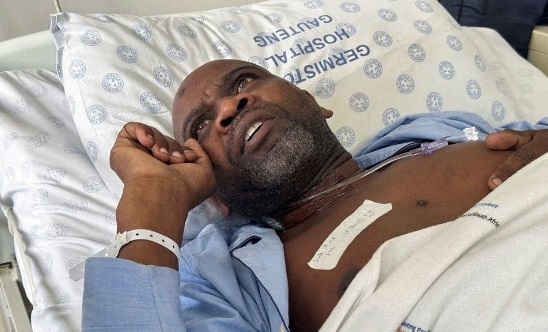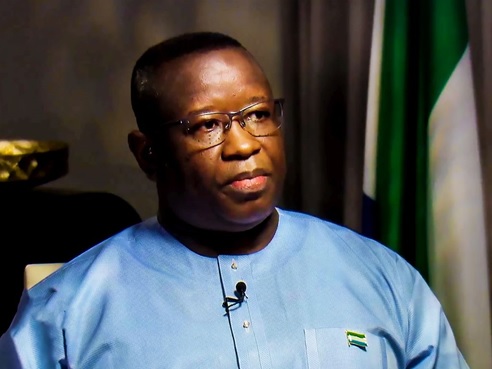JOHANNESBURG, (REUTERS) – Like many impoverished residents of downtown Johannesburg, Sihle Dube had rented a tiny room from someone who didn’t actually own it, in a rundown building that was becoming a trash-strewn haven for drugs and crime.
On Thursday, he awoke to a bang at 2 a.m. – one of the few things he would remember about that night was seeing the time on his phone – and jumped up to check the entrance to his apartment.
Smoke came billowing in.
“It was unbearable; I couldn’t breathe,” he said, covering his mouth for emphasis as he lay in a hospital bed the next day.
Dube scrambled into his trousers and tried to climb out of his first floor window, but he slipped on a satellite dish, fell and blacked out. An ambulance rushed him to the Bertha Gxowa Hospital in nearby Germiston.
More than 70 others did not make it out alive, one of Johannesburg’s worst disasters in living memory.
The deadly fire highlighted a problem that authorities have long failed to tackle: Johannesburg’s city centre is so abandoned by business and the state that gangs and extortionists have moved in to fill the void.
Dozens of abandoned buildings have been “hijacked” or taken over by criminal syndicates who charge fees for staying there. Angela Rivers, general manager at the Johannesburg Property Owners and Managers Association, said she knew of 57 such buildings in the central business district alone, most of them owned by the city or provincial government.
Many have become dilapidated centres of drug trafficking and other lawlessness. Fires sometimes break out because residents rely on illegal electricity connections, gas burners and candles.
Investigators have not determined the cause of Thursday’s blaze. But the brick apartment block, now gutted and blackened with soot, was one such building.
Johannesburg city authorities leased it to a charity providing shelter for women in 2016, but it had “ended up serving a different purpose”, Mayor Kabelo Gwamanda told reporters later on the day of the fire, without elaborating.
A few years ago, the charity ran out of money and quietly stopped operating, so the building began filling up with drug users and desperately poor migrants, residents said.
“People were selling drugs, taking drugs, prostitution,” Dube said. “It was dirty; water running all over; rubbish everywhere.”
Spokespeople for the City of Johannesburg and police did not respond to requests for comment about the residents’ accounts. But Johannesburg city manager Floyd Brink said there was a plan to get hijacked buildings back under control. He did not provide details, saying it needed council approval.
“This has given us a wake-up call,” President Cyril Ramaphosa told journalists on Saturday. “Our cities and municipalities must now pay attention to how people live.”
‘WE CRIED’
The building was a relic of South Africa’s apartheid past. Ramaphosa recalled going there to collect what Black South Africans contemptuously called a “dompas” – a “dumb pass” to allow them to work in white areas of the city.
Decades of white minority rule, under which Black people were forcibly relocated to townships and rural areas, have left South Africa with some of the world’s worst extremes of wealth and poverty, and a critical shortage of housing.
The arrival of hundreds of thousands of migrants, many fleeing poverty and conflict in other parts of Africa, in the decades since apartheid ended in 1994 has added to the housing crisis.
Dube, 49, grew up in Utrecht, a rural town in eastern South Africa, at the foothills of the Balele Mountains. But there was no work there, he said, so in the early 2001, he moved to the country’s biggest city to work as a security guard.
His sister Ethel Jack, 60, moved later that decade to seek domestic work.
They’d both become used to living in over-crowded buildings populated by dubious characters claiming rent for their “property”, they said. In one place Jack stayed, a different man knocked on her door every month-end for his 400 rand ($21).
“If you don’t pay, they chase you out the building,” she said, standing outside the wreckage of the fire that nearly killed her brother, on a street covered in trash and cordoned off with police razor wire.
Residents are often afraid to seek help because of the risk of being deported or threats from landlords, Dube said.
When he first moved into the block in 2019 it was clean and not too crowded. A woman who had been housed there by the charity was leaving, and he paid her 4,000 rand to have the room for as long as he pleased.
But since the charity stopped using it, he said, the building had become a target for rent-seeking syndicates.
“People were claiming the rooms are theirs. One would say ‘I’ve got five rooms’ and start renting,” he said.
By 2021, there were many more residents crammed into the block. Trash accumulated; the building started to smell.
Although the cartels were preying on foreigners, it was cheaper than paying legitimate rents, said Chinte Mustafa, a 33-year-old food-delivery driver from Malawi.
“Every month, we cried because the money was finished on the rent,” he said, standing near the police cordon. So he moved into the building and paid 800 rand a month for a room.
“Now, I don’t know where my family are going to live.”
‘EVICTION WOULDN’T HELP’
Responding to residents’ complaints, police arrested three people for illegally collecting rent in 2021, Dube said. But they threatened to cut the electricity, which was illicitly connected, so residents didn’t dare call authorities again.
In 2019, the municipality tried to evict the residents. But human rights groups took them to court, said Annie Michaels, an activist from the Johannesburg Migrants Advisory Panel, which has been supporting migrants in the building.
“We told them eviction wouldn’t help,” she said. “They would just have made a lot of people homeless.”
The municipality backed down, Michaels said, but “they just left the building as it was. They did nothing more.”
Shocked at the state of the building, Jack urged her brother Dube to move, but he never did. So when family members heard about the fire, they feared the worst.
“We thought maybe he was among the deceased,” Jack said.
Hours later, he called her from the hospital: he’d survived.







